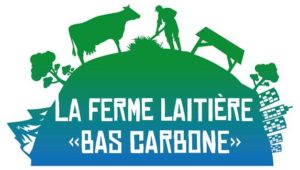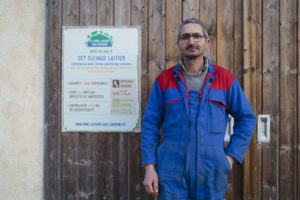 La Ferme laitière bas carbone vise à promouvoir des pratiques agricoles et des leviers d’action afin de réduire de 20% l’empreinte carbone du lait produit d’ici 2025. Cette démarche française est portée par le CNIEL (Centre national interprofessionnel de l’économie laitière), en partenariat avec l’Institut de l’élevage, France conseil élevage et les Chambres d’agriculture.
La Ferme laitière bas carbone vise à promouvoir des pratiques agricoles et des leviers d’action afin de réduire de 20% l’empreinte carbone du lait produit d’ici 2025. Cette démarche française est portée par le CNIEL (Centre national interprofessionnel de l’économie laitière), en partenariat avec l’Institut de l’élevage, France conseil élevage et les Chambres d’agriculture.
En Auvergne-Rhône-Alpes, le GAEC de la Croix Pomiers rassemble 85 Montbéliardes et mène des actions pour accroître l’autonomie alimentaire de l’élevage par la mise en place du pâturage tournant, en augmentant la part des légumineuses, avec des impacts certains pour la réduction des intrants. Toujours dans cette région, le GAEC de Sully a réussi à réduire de 33% les apports en engrais et à augmenter son autonomie alimentaire en cultivant la luzerne et la chicorée.
La production agricole et le changement climatique sont des enjeux intrinsèquement liés de manière que les deux s’influencent mutuellement. En montagne, les effets du changement climatique sur la production laitière ont été étudiés par le CNIEL dans le programme CLIMALAIT (2015-2019). Certaines solutions mises en avant dans le cadre de CLIMALAIT comme leviers d’adaptation au changement climatique sont également utilisées dans le cadre de la démarche ‘Ferme Laitière Bas Carbone’ comme actions permettant de réduire l’impact climatique de la production laitière. Autonomie alimentaire et réduction des intrants, entre autres, peuvent donc être des leviers à la fois d’adaptation et de l’atténuation du changement climatique en montagne.
Découvrez dans notre bonne pratique comment la production de lait en montagne peut contribuer à l’atténuation et à l’adaptation au changement climatique.











